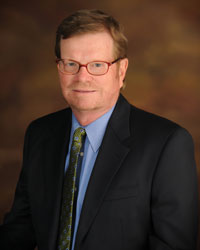What makes Port Corpus Christi ideal for wind-industry transport?
Our location, first of all. So many manufacturing facilities are being built within our reach, and even beyond the huge number of wind farms that already exist or are currently in development in Texas, we service many other active areas such as Colorado, Iowa, North and South Dakota, and up into the Midwest. You can have all of the other components in place, but if you’re not centrally located then you aren’t even going to be considered.
It’s also about the ease of shipping from the port to the job site, and that’s another area where we really excel since it’s a straight shot from Corpus Christi north to San Antonio, where interstates 10 and 35 intersect and you can basically head in any direction you need to. And when you’re leaving port property you don’t have to pass through any neighborhoods or areas with tight turns that make trucking large wind components difficult. Not only does that save a lot of time and unnecessary headaches, it decreases the risk of damaging the merchandise. So the unfettered access to the interstate systems is a huge advantage, and rail infrastructure is also critical.
We have three class-I railroad companies operating here, including Burlington Northern Santa Fe, Union Pacific, and Kansas City Southern, all of which have shipped wind turbine parts from here to the job site. Kansas City Southern just made their first wind shipment from Port Corpus Christi recently, in fact, and it went so well that they featured the project on their Web site, emphasizing how the close cooperation between the manufacturer, port, and railway really made all the difference. They were very pleased by how well everything went, and so are we.
What role will the port play in supplying wind farms that will be developed off the U.S. coast?
In that case parts will be shipped to us from manufacturing facilities located here in the States or overseas for storage, prepping, and some assembly work before they’re transferred to the vessels that will carry them out to the offshore site. It will be a very different situation than what we encounter handling components for onshore wind installations, mostly because offshore blades, towers, and other components are so much larger than what’s typically found inland. So that means you need plenty of unrestricted space both for handling as well as storage, and you want it to be fenced in and lighted for security, as our yards are. One thing we’d like to see whether we’re talking about onshore or offshore wind farms, though, is for manufacturers to realize the many advantages of building their facilities near the port, which is something our economic development team is really focusing on. That way every one of the benefits we’re discussing here would be immediately available to them, with the related cost savings as well.
Is there any special equipment or training involved in handling these huge parts?
We do a lot with the military, so we’re accustomed to handling large pieces such as jeeps, tanks, and Humvees, and we already have the equipment we need to lift and position loads of any shape and size. The real secret is in having people handling this sensitive, expensive cargo who know what they’re doing. We work with Gulf Stream Marine, which is one of the largest stevedore companies in the Gulf Coast area, and they do provide their employees with specific training on how to work with wind components. Our entire labor force has really been proactive in making wind a priority project for us, and to make sure that we’re doing things right.
We also work very closely with logistics service providers, keeping the lines of communication open as to when their customers’ shipments will be arriving, and what they’ll need once they get here. We understand that companies lose money when the parts they need don’t arrive on time, so we take our role in all of this very seriously, and we’re eager to prove why we’re a premier port of entry for shipments destined for the new wind farms being brought online and in development across the United States.
For more information: Call (800) 580-7110, e-mail businessdevelomentdpt@pocca.com, or go online to www.portofcorpuschristi.com.






























